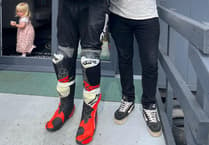There is no mystery to making compost, nature does a lot of work,’ says Anne-Marie Corrin at Ballanevin Compost.
She should know. At Ballanevin they make this brown wonder material literally by the ton.
Better yet, their compost is not only peat free it’s also Manx and very sustainable, a fully circular process that takes garden waste to make a substance that feeds the soil.
‘Compost is a powerful food for plants and vegetables, it improves soil structure, retaining water. Composting makes healthy soil, healthy soil makes healthy food. Good soil is important to every aspect of human, animal and plant life on earth,’ adds Anne-Marie.
So how did she and her husband, Dave, come to own a compost producing business?
‘That’s the first thing people always ask us,’ she tells me when I go to meet them at the Ballaneven yard, in St John’s.
They both come from farming backgrounds. Dave’s family is from Ballaglonney at the Fairy Bridge and Anne-Marie’s brother is Adie Corlett from Baldrine Farm.
‘We both appreciate the importance of good soil health, and love working and being outdoors.
‘Dave is extremely hands-on and practical and I’m passionate about gardening and the benefits of growing your own plants and vegetables and we both love getting our hands dirty,’ says Anne-Marie.
So when they were looking for a business that suited their skill sets and that they could work in together, Ballaneven fitted the bill.
‘We took a viewing, and instantly knew this would work for us and that together we could bring it to its full potential.’
However, when they took over the business in July 2020 they still had a lot to learn, as Anne-Marie explains: ‘We have learned everything about making compost quite literally from the ground up.’
Ballaneven compost is made from 100% green waste and Dave explains why this is important. He says: ‘Peat compost will be banned in England in 2024 because harvesting peat is like chopping down rain forests. Peat bogs take thousands of years to make and they store carbon. When they are dug up, it releases harmful carbon into the atmosphere.
‘In one year in Britain alone, peat for garden use releases half a million tonnes of carbon dioxide, equivalent to 100,000 cars on the road.’
Making compost is essentially a simple process but there are a lot of regulations surrounding it when you are doing it commercially.
Dave and Anne-Marie had to be licensed by the Department of the Environment, Food and Agriculture and learn the PAS 100 systems which is the industry standard certification for compost.
Their process begins with green waste which comes from three amenity sites, Northern, Southern and Western, and from Peel Commissioners, local gardeners and landscapers.
This all has to be checked carefully, as Anne-Marie explains: ‘We have to be vigilant for certain things like Japanese Knotweed that cannot be accepted here under any circumstances.
‘We don’t want any single use plastic either that has to be taken out before it goes through.’
‘It’s amazing what we’ve found put in with the green waste. I’ve had jars of curry, rolls of wallpaper, you think of it, I’ve had it,’ adds Dave.
You need four things to make good quality compost: carbon, nitrogen, oxygen and water. The carbon comes from the sticks, dry leaves, wood chippings in garden waste and the nitrogen from the grass cuttings.
Anne-Marie says: ‘Micro-organisms get to work and break down the green waste. Over time, with turning it, air added, and heat, it all breaks down into lovely compost. It needs a constant heat of over 131F more than three days minimum to kill all weeds, pathogens and any bugs, all heat sterilised. We monitor and record the temps every day. We have recently built a large commercial polytunnel and that will be used as a testing facility for our compost on a variety of plants.
‘It takes approximately six months to make our compost. It depends on weather conditions, turning cycle, and heat temperatures. It cannot get too dry, or too wet. We regularly turn the compost to increase oxygen to get the microbes working to make the compost.’
The compost is also regularly tested and analysed at the government laboratories.
Anne-Marie says: ‘We would like to thank DEFA for their assistance and support. It is important that we all work well together and they have supported us with the grants.’
The couple have been very busy since they took over Ballaneven. Alongside making the compost and getting to know their customers, they have built a big new shed, put up a polytunnel and organised and extended the yard.
But the biggest news, which will bring them a whole new raft of customers, is that they have recently acquired a new bagging machine so that instead of selling their compost to garden centres, gro-wers and other larger organisations in one tonne tote bags, they can now sell to every keen gardener in the island in smaller, 40-litre bags.
These are now being stocked by Kirby Park Garden Centre, Riley’s Garden Centre, Alexander Nurseries, Sadler Agricultural Supplies, Watsons Nurseries and Ballagawne Garden Nurseries. The Southern Recycling Centre also sells their compost in smaller amounts.
They operate a system where customers buy a 26L tub & lid filled with compost for £10 then charge £3.50 for each tub refill.
Some of the garden centres have been trialling the compost before selling the smaller bags to their customers.
Anne-Marie says: ‘It is good for the environment, it reduces the amount of landfill, and the use for chemical fertilisers used.
‘In fact we are currently trialling our compost for use in the island’s agriculture with Will McMillin, one of the island’s leading arable farmers and we have invited DEFA to be involved and, who knows, in the future it could be rolled out to other farms.
Now, 18 months into their ownership of Ballaneven, things are going well.
Anne-Maris says: ‘‘We’re happy to say that the business is growing nicely and we’ve just taken on our first full time member of staff, Ste Harris.
‘We are proud of our compost and ensure every customer has the best possible service and compost for their individual needs.’

.jpeg?width=209&height=140&crop=209:145,smart&quality=75)



Comments
This article has no comments yet. Be the first to leave a comment.